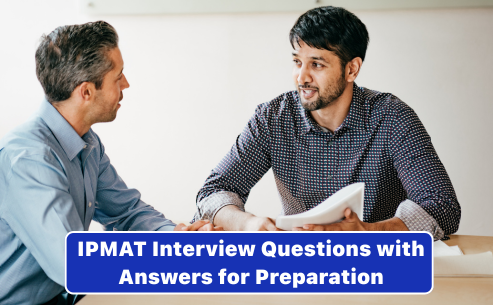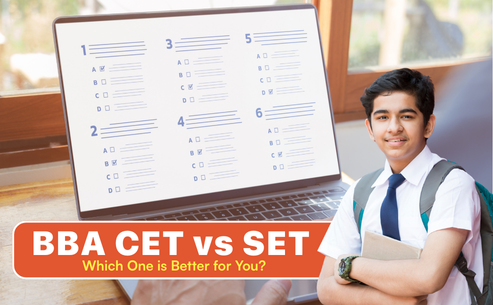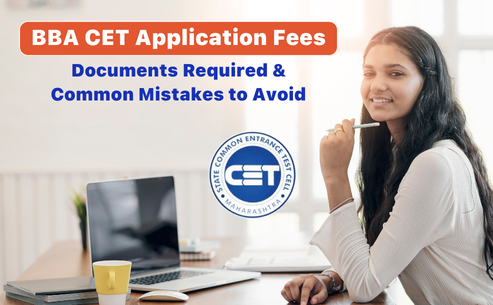So, you’ve cleared the IPMAT entrance test—congratulations! But as every IIM aspirant quickly realizes, the real challenge is just beginning. The next crucial milestone on your journey to IIM Indore, IIM Rohtak, or IIM Ranchi is the Personal Interview (PI) round. This is where your personality, clarity of thought, awareness, and communication skills are put to the ultimate test.
If you’re feeling nervous about the IPMAT interview—trust us, you’re not alone. The interview isn’t just about answering questions. It’s about showcasing who you are beyond marks and metrics.
Whether it’s your introduction, academic background, opinions on current affairs, or ethical dilemmas, the panel will assess your depth, spontaneity, and confidence.
But don’t worry—we’ve got you covered.
This blog is your IPMAT 2026 PI tip sheet. It walks you through:
- The most commonly asked IPM interview questions
- Types of IPMAT Interview Questions with sample answers that set the right tone
- Innovative strategies to structure your responses
- And top tips to crack your IPMAT Interview
At Tarkashastra, we believe in simplifying the complex. No jargon, no fluff—just what you need to crack your interview with clarity and confidence. Whether you’re targeting IIM Indore, Rohtak, or Ranchi, this guide will help you present your best self and secure that final offer letter.
Let’s dive into the world of IPMAT interviews and start preparing—smartly and strategically.
Most Commonly Asked IPMAT Interview Questions (with Sample Answers & Tips)
The IPMAT Personal Interview round is designed to test your personality, clarity of thought, awareness, and communication skills. While there’s no fixed question bank, specific questions are frequently asked across IIM Indore, Rohtak, and Ranchi interviews. Below is a curated list of the most common IPM interview questions, sample responses, and tips to help you craft your own answers.
1. Tell me something about yourself.
Purpose:
An ice-breaker question to assess your personality and steer the interview direction.
Tips to Answer:
- Structure: Name → Location → Education → Achievements → Hobbies → Career Goals
- Be conversational and confident.
- Avoid personal financial or family problems.
Sample Answer:
“I’m [Your Name], a Class 12 student from [Your City], currently pursuing [Your Stream] at [School Name]. I’ve always been curious about business and decision-making, which led me to explore management early. I’ve taken part in debates, school council elections, and a business simulation competition last year. Apart from academics, I enjoy reading and playing chess, which helps sharpen my focus.”
2. What are your hobbies or extracurricular activities?
Purpose:
To assess your interests outside academics and whether you have a balanced lifestyle.
Tips to Answer:
- Share how your hobby helps you relax or grow.
- Be prepared for 2–3 cross questions (e.g., recent trends, frequency, “why this hobby”).
Sample Answer:
“In my free time, I enjoy reading books on management and leadership, as it helps me stay informed about evolving industry trends and frameworks. I also have a keen interest in sports, especially [mention any sport], which has instilled in me the importance of teamwork and resilience. Furthermore, I actively engage in community service initiatives, as I find great fulfillment in giving back and making a positive impact on society.”
Common Follow-up Questions You Should Be Prepared For:
- In-depth knowledge of your hobby: Be well-versed in your hobby. For instance, if you mention cricket, you should be familiar with its rules, key terminologies, and recent tournaments or events.
- Frequency of engagement: Be ready to explain how regularly you pursue this activity and how you incorporate it into your routine.
- Reason behind your interest: Clearly articulate why this hobby appeals to you and what you gain from it—whether it’s relaxation, learning, or personal growth.
Additional Notes:
- If you have multiple hobbies, mention them in order of how often you engage with each, starting with the most active.
- If you don’t have a traditional hobby, that’s absolutely fine. You can mention any activity you enjoy in your free time, such as video gaming, working out, watching films, or web series, as long as you explain its value in your life.
3. What are your strengths and weaknesses?
Purpose:
To evaluate your self-awareness, honesty, and emotional intelligence.
Tips to Answer:
- Mention up to 3 strengths with examples.
- Share 1–2 manageable weaknesses and how you’re working on them.
Sample Answer:
“My strengths include time management and public speaking, developed through leading school assemblies and competitions. A weakness I’ve identified is being overly self-critical. I’ve started journaling and using feedback loops to view things more constructively.”
Common list of strengths:-
- • Hard working
- • Perseverance
- • Honesty
- • Fast learner
- • All-rounder
- • Creative/ Innovative
- • Dedicated
- • Flexibility/ ability to adapt to new situations/Resilient/Adaptability
- • Committed
- • Passionate
- • Team worker/collaborative
- • Good public speaking skills
- • Analytical/ critical thinker / Good problem-solving abilities
- • Leadership qualities / Good planning skills
- • Self-control/self-discipline
- • Sharp memory
- • Ambitious
- • Good at time management
- • Empathy and kindness
- • Strong quantitative and logical reasoning skills
- • Good problem-solving abilities
- • High emotional Intelligence
- • Handling constructive criticism
- • Being Optimistic/positive
- • Good social skills
- • Detail oriented.
Common list of weaknesses:-
- • Self-critical, causing burnout and frustration
- • Too detail-oriented
- • Too competitive
- • Risk-averse
- • Procrastination
- • Insecure
- • Fear of public speaking
- • Being a too introvert/ shy person
- • Being a too extrovert/overtalkative person
- • Studying so much that not getting time for hobbies
- • Difficulty in adapting to a new environment.
4. Why do you want to join the IPM course at IIM?
Purpose:
To gauge clarity about the program and your long-term goals.
Tips to Answer:
- Relate your academic interests to IPM’s unique structure.
- Avoid superficial reasons like placements or brands.
- Research the specific IIM’s curriculum.
Sample Answer (Commerce background):
“Sir, studying Business Studies in Classes 11 and 12 made me curious about domains like marketing and finance. The IPM program at IIM not only covers these but also offers a strong liberal arts foundation, preparing me for leadership roles. It aligns perfectly with my ambition to pursue business strategy in the future.”
In-depth Guidelines for Framing Your Answer:
- Do Your Research: Begin by thoroughly exploring the official website of the specific IIM you are applying to. Familiarize yourself with the IPM curriculum, course structure, teaching pedagogy, internships, and any unique features the program offers.
- Align with Your Career Goals: Your response should clearly demonstrate how the IPM program supports your long-term academic and professional aspirations. For instance, if you aim to become a business leader or entrepreneur, explain how the integrated management training and exposure offered by the IPM course will help you build the required knowledge and skill set.
- Avoid Superficial Motivations: Never cite reasons such as high placements, attractive salaries, or campus aesthetics. These are not considered thoughtful or sincere motivations during an interview and may reflect poorly on your intent.
- Stay Humble and Focused: Avoid making exaggerated statements about the prestige or glamour of the IIM brand. Instead, focus on the academic rigor, holistic development, and early exposure to management principles that make the IPM program the right fit for your growth journey.
5. What is one thing you want to improve about yourself?
Tips to Answer:
- Mention a weakness you’re actively addressing.
- Back it up with a real-life example.
Sample Answer:
“I tend to overthink before making decisions, which sometimes delays my response. I’m working on this by practicing time-boxed decision-making during group activities, which is helping me trust my instincts better.”
6. Where do you see yourself in the next 5–10 years?
Purpose:
Assesses goal-setting ability and alignment with management studies.
Tips to Answer:
- Align your answer with management aspirations.
- Show ambition, but remain realistic.
Sample Answer:
“In the next 5–10 years, I see myself as a management consultant helping businesses grow sustainably. I want to explore different domains through internships, understand industry needs, and eventually work towards establishing my own venture in the EdTech sector.”
7. Describe a challenge you faced and how you handled it.
Purpose:
Tests resilience, problem-solving, and leadership.
Tips to Answer:
- Use the STAR framework (Situation, Task, Action, Result).
- Keep it concise and impactful.
Sample Answer:
During a group project on entrepreneurship, we had a team conflict due to differing ideas. I proposed structured brainstorming sessions, where each idea was evaluated objectively. It brought clarity and helped us present a unified business plan that won second prize at the district level.”
8. Why should we select you?
Purpose:
Tests confidence and clarity in what you bring to the table.
Tips to Answer:
- Focus on your values, not just achievements.
- Mention how you’ll contribute to the IIM community.
Sample Answer:
“I bring a mix of academic curiosity, leadership, and empathy. I’m not just here to learn but also to share and contribute—whether it’s through clubs, events, or peer support. I believe my commitment to growth and collaborative spirit aligns well with the IIM culture.”
9. What is your understanding of management?
Sample Answer:
“To me, management is about aligning people, processes, and resources toward a common goal. It involves effective planning, decision-making, and communication. Good management builds sustainable systems and empowers teams to solve problems innovatively.”
10. If you were to start a business today, what would it be and why?
Sample Answer:
“I would launch an AI-driven learning app focused on life skills like financial literacy and communication for school students. There’s a growing demand for such skills, and I believe technology can make them accessible and engaging.”
11. Elaborate on your participation in an international competition. What was your stand there?
Purpose:
Tests your ability to reflect on past achievements and learnings.
Tips to Answer:
- Describe the event clearly (when, where, what).
- Share your role, achievements, and learnings.
- Highlight preparation and impact on your personality.
Sample Answer:
“Last year, I represented my school at the International Economics Olympiad held virtually with participants from 15 countries. Our team secured the 3rd position. I led the research and analysis segment, focusing on sustainable finance. Preparing for it involved months of rigorous practice, simulations, and collaboration. This experience taught me teamwork, global perspectives, and time management under pressure.”
12. What are your plans after completing the IPM course?
Purpose:
Assesses your career planning and future vision.
Tips to Answer:
- Discuss potential career paths (e.g., consulting, entrepreneurship, public policy).
- Mention your personal development goals.
- Show ambition, clarity, and flexibility.
Sample Answer:
“After completing IPM, I plan to gain experience in consulting or strategy roles to understand real-world business challenges. My long-term goal is to work on building sustainable business models and eventually launch a venture focused on social entrepreneurship. I also aim to strengthen my analytical, communication, and leadership skills during college.”
13. What skills do you hope to develop in college?
Purpose:
Evaluates self-awareness and commitment to growth.
Tips to Answer:
- Mention both technical and soft skills.
- Share what you’re already doing and how IIM will accelerate your learning.
Sample Answer:
“I want to improve my analytical thinking, public speaking, and decision-making under uncertainty. I’m currently part of my school’s business club and frequently participate in group discussions. At IIM, I plan to take full advantage of case studies, live projects, and student-led clubs to hone these skills further.”
14. Why did you choose IPMAT as your career path?
Purpose:
To judge your motivation and clarity regarding management education.
Tips to Answer:
- Connect your passion to the structure of the IPM.
- Mention relevant skills or school experiences that led you to this choice.
Sample Answer:
“Business studies and economics sparked my curiosity about how organizations function. The integrated structure of IPM allows me to develop core business knowledge from an early stage while giving me exposure to liberal arts and analytics. This blend makes IPMAT the ideal route to achieve my long-term goal of working in strategic consulting.”
15. What are your hobbies?
Purpose:
Assesses personality, interests, and time management.
Tips to Answer:
- Name your hobbies clearly.
- Link them to qualities like discipline, creativity, or resilience.
- Be ready for cross-questions.
Sample Answer:
“I enjoy creative writing and have been maintaining a blog for two years. It helps me express my thoughts clearly and build discipline. I also play badminton regularly, which keeps me physically and mentally balanced. I believe these activities add value to my personality and help me stay productive.”
16. What makes you unique?
Purpose:
Understand what differentiates you from others.
Tips to Answer:
- Mention a combination of skills and values.
- Back your statement with an example or incident.
Sample Answer:
“I think my ability to connect with people and communicate clearly is a unique strength. I’ve often been the go-to person in school for organizing group events or resolving peer conflicts. This quality helps me lead with empathy and ensures that everyone’s voice is heard.”
17. Why do you prefer IPM over other courses like BBA+MBA?
Purpose:
Tests your understanding of IPM’s value proposition.
Tips to Answer:
- Highlight IPM’s early foundation, interdisciplinary approach, and immersive learning.
- Compare it factually to traditional routes.
Sample Answer:
Unlike the traditional BBA+MBA route, the IPM program integrates management education from day one. It blends subjects like psychology, statistics, and communication with core business fundamentals, making it a holistic program. Moreover, the opportunity to study at a premier IIM campus from the start adds immense value to personal and professional growth.”
18. Why do you want to study a degree in management at an early age?
Purpose:
Gauges motivation for pursuing a management career straight after school.
Tips to Answer:
- Talk about your early interest and how you’ve explored it.
- Link your interest to real-world relevance.
Sample Answer:
“Since the day I joined my school entrepreneurship club, I’ve realized how crucial good management is to build impactful solutions. Learning it early gives me an edge to develop deeper insights. IIM’s IPM program allows this exposure through a structured path that balances academics and real-world learning.”
19. How would you view a new economic or business event that has happened recently?
Purpose:
Checks your general awareness and critical thinking.
Tips to Answer:
- Stay updated with at least 2–3 current economic events.
- Structure your response: Event → Impact → Personal View.
Sample Answer:
“The recent RBI rate hike was a significant step to manage inflation. While higher rates may slow down spending, they help stabilize the economy. I believe such moves are necessary short-term trade-offs for long-term fiscal health. The real challenge is balancing inflation control and investment promotion.”
20. Where would you like to be in 10 years?
Purpose:
Reveals long-term planning and alignment with management goals.
Tips to Answer:
- Be realistic and goal-oriented.
- Show flexibility and learning intent.
Sample Answer:
“10 years from now, I see myself as a management consultant with a strong understanding of business strategy. I want to explore multiple industries, build strong networks, and eventually launch a startup that addresses real societal challenges. My focus will be on continuous learning and contributing to meaningful change.”
21. How do you handle stress and pressure?
Purpose:
Evaluates emotional maturity and coping mechanisms.
Sample Answer:
“I manage stress by staying organized and planning ahead. I break big tasks into smaller ones and prioritize effectively. I also practice mindfulness and deep breathing during high-pressure moments. Playing badminton and journaling are other ways I unwind and keep my mind clear.”
22. Discuss a time when you demonstrated leadership skills.
Purpose:
Checks your initiative-taking and people management capabilities.
Sample Answer:
“In school, I led a group project to help a local startup build a sustainable business model. I organized brainstorming sessions, delegated roles based on strengths, and kept everyone motivated. Despite initial differences, we collaborated effectively and our plan was appreciated by the judges. It taught me the importance of clear communication and inclusive leadership.”
Bonus: Other Frequently Asked IPMAT PI Questions
Here are more questions you should be ready to tackle:
- Why IPM over traditional BBA+MBA?
- What motivates you to pursue a career in management?
- How do you manage stress or pressure?
- Describe a time you took initiative.
- Which business leader do you admire and why?
- How do you stay updated with current affairs?
- What recent economic policy impacted you the most?
- Have you applied to other B-schools? What’s your backup plan?
- Which domain (finance, marketing, HR, etc.) do you want to specialize in and why?
- What does success mean to you?
- Tell me something about yourself that is absent from your Resume/ Profile.
- Tell me a few unique things about your city/ town/ village.
- Which specialization do you prefer and why? ( Finance/ Marketing/ consulting/HR/Operations/IT?) (Answer according to your first preference of specialisation)
- Give an instance where you stepped in, took charge, mustered support, and influenced the outcome of a project by taking on a leadership role.
- What are your hobbies?
- What is your aim in your life? Where do you see yourself in the next 5-10 years?
- What are the things you are passionate about? Have you done anything about them? If yes, what? If not, why not?
- What are the few takeaways from your previous education/ work experience/ internships?
- Have you participated in any non-academic co-curricular activities? How important do you think these activities are in general?
- Why did you choose this (your stream in class 12 or any other selection of course)?
- Why are your grades low, or have they decreased/ not improved significantly?
- Tell me something about your school.
- Tell me something about your role at your school.
- Why did you decide to pursue IPM/ MBA and not establish yourself in some other relevant course/ degree related to the same stream (Science/ commerce/ humanities, etc)?
- Why do you think you are the right candidate to be a part of an IIM Rohtak?
- Why do you want to pursue an IPM/ MBA instead of a relevant course/ degree in your domain (Doesn’t apply to BBA graduates)?
- Which domain do you think (amongst sales and marketing, operations, finance, IT, HR, and strategy) is the most important for an organization?
- Describe a time when you were a part of a team. Describe the challenges you faced as part of that team. Have you ever challenged a leader/ boss in school/ college or in previous work experience?
- Describe a time you led a team. Describe your leadership style and the obstacles you faced as a team leader.
- What is your biggest accomplishment? What is your biggest failure?
- Do you work well under pressure and manage your time well? How do you manage your time?
- Describe a setback and the lessons you learned from it.
- Describe a time when you had to overcome hardship.
- What are your long-term career goals?
- What are the most important qualities of a good manager?
- How do you prioritize tasks when you have multiple deadlines?
- What do you know about IIM’s integrated program curriculum?
- How would your teachers or peers describe you?
- What are some of your notable achievements?
- How do you plan to contribute to the campus community if selected?
- What role do ethics play in management?
- How do you handle constructive criticism?
- What are some recent developments in the field of management that interest you?
- How do you manage your time between academics and extracurricular activities?
- What skills do you hope to develop through this program?
- How do you ensure effective communication in a team setting?
- What do you think is the biggest challenge facing managers today?
For IPMAT Hobbies and Personal Interview Questions
- Your business plan for the future
- Cocurricular and extracurricular achievements
- Explain the game you play (Any achievements)
- Role of NCC (if you have an NCC certificate)
- Details of the sport you like
- History of your state (Formed, Naming)
- First CM of your state
- The famous CM of your state
- State animal
- Leading agricultural products from your state
- Delhi monuments
- Profession of mother and father with cross questions
- If you have one crore to invest, where will you invest?
- Backup plan if not selected
- PCM to IPM, why, why IPM Indore/Ranchi/ Rohtak specifically?
- Your phone/ laptop configuration
- Which states have you visited? Name with a capital also
- Which book have you read recently and cross-questioned
- Which series did you watch recently and cross-question
- Science student: If you join IPM. India will lose a scientist
- Science student: How will your science/ PCM/ PCB background help you in management?
- What leadership qualities do you have?
- Difference between a manager and a leader
- Is it essential to work on a deadline?
- Your dream destination and why
- What type of podcast do you listen to?
- How does the podcast industry earn?
- Your role model and how his business qualities will help you in business
- How would you define success?
- Social responsibilities of management
- Difference between an entrepreneur and a businessman
- What is the quality your father/ mother admires you for most
- What is the thing your father/ mother complains about you?
- What do you learn from your hobby, and how do you use it in business?
- What are the things you would like to improve in yourself?
- Meaning of your name, father’s name, and mother’s name
- Why does Delhi, a union territory, have a CM?
- Vegetarian and non-vegetarian, who is right
- Name celebrities who are pushing for conversion to vegetarianism?
- What are FMCG companies? Name some
- Name three male/ female athletes
- The highest sports award in India
- Details about other exams if you have cleared.
- Why does China want Arunachal Pradesh? (As I lived in Arunachal Pradesh for some time)
- Your city’s PIN code. Is there only one PIN code or many?
- Questions on certificates/ achievements
- Do you love sleeping? Do you sleep during the day?
- Sorrow of Bihar? (Bihar home state) 95. Name of the cricket stadium in Lucknow. CM of UP, where is he from? ( UP home state)
- Cities you will cross from one city to another (state-based)
- Why is IPM at our college different from IPM? What is Puducherry famous for?
- Mountain ranges and hill stations in your state
- Which political commentators do you like? Are you a left-winger or right-winger? Difference between the two.
- Are you left-wing or right-wing?
- Summary of a book you read recently
- Why do I select you over other students?
- Why is there a percentage difference between the 10th and 12th
- If you travel from your home city to our college. Which states will you cross? Capital of each state
- Which college are you studying at right now? Why does our college prefer it over it?
- Why is your city, Hyderabad, called the city of nawabs?
- Name some tourist places in your state
- What is your city famous for?
- You study German/ French. Give your introduction in the same language.
What Questions Can Be Expected in the IIM IPM Interview 2025?
The IIM IPM Personal Interview typically follows a three-part structure:
- Personal Questions
The interview often begins with questions about your background, personality, and interests, especially during your introduction.
- Academic Questions Based on Your Stream
The next set of questions is usually tailored to your Class 11–12 stream—Science, Commerce, or Humanities. Interviewers may ask questions related to your favourite subject, concepts you’ve studied, or why you chose your stream.
- General Knowledge & Awareness-Based Questions
The final part involves current affairs, GK, and opinion-based topics, including political, social, or economic events.
Pro Tip: Most follow-up questions are built upon your answers. Hence, craft your introduction strategically.
Types of IPMAT Interview Questions – With Sample Answers
The IIM IPM interview is not limited to personal or current affairs questions—it also delves into your academic background, general awareness, and behavioural mindset. Here’s a detailed look at the different question categories, along with sample answers to guide your preparation:
Academic Questions
These questions assess your clarity of thought and interest in your chosen stream (Science, Commerce, or Humanities), as well as your school-level understanding.
1. What was the reason to choose commerce/science/arts?
Sample Answer:
“I decided to go into commerce since I was always curious about how businesses are run, how financial systems are developed, and how strategic decisions shape outcomes. It aligns with my long-term career goals in management and entrepreneurship.”
2. Which was your favourite subject at school and why?
Sample Answer:
“My favorite subject was Economics because it allowed me to analyze both micro and macro-level problems. I enjoyed applying theory to real-world scenarios and found solving economic models both intellectually rewarding and practically insightful.”
3. How did you prepare for IPMAT?
Sample Answer:
“I followed a structured timetable with dedicated time slots for Quantitative Aptitude and Verbal Ability. I took regular mock tests and spent time analyzing my mistakes, which helped improve my performance steadily.”
General Knowledge & Current Affairs
Interviewers expect you to be aware of national and global developments, especially in business, economics, and governance.
4. What’s your opinion on a recent news headline?
Sample Answer:
“I recently read about India’s transition towards electric vehicles. I believe it’s a vital step toward sustainable development. However, the success of this transition depends heavily on robust infrastructure, policy support, and public-private partnerships.”
5. Who is the current RBI Governor?
Sample Answer:
“As of 2025, the Governor of the Reserve Bank of India is Shri Sanjay Malhotra.”
Situational & Behavioral Questions
These questions test your interpersonal skills, problem-solving ability, and emotional intelligence—key traits for future managers.
6. What would you do if you were a team leader and your team was not cooperating?
Sample Answer:
“I would begin by understanding the team’s concerns—through one-on-one conversations if needed. Then, I’d work on aligning everyone with the common goal by fostering open communication and emphasizing the purpose. Inspiration and empathy often bring people back together.”
7. How do you handle failure or criticism?
Sample Answer:
“I treat failure as a learning opportunity. I maintain a journal where I write down criticisms and setbacks, reflect on them, and use them to plan better. I try to stay focused on growth without letting criticism affect my self-worth.”
Presentation and Communication Tips for the IPMAT Interview
Your non-verbal communication and interpersonal behaviour are just as important as your answers in a personal interview. The way you present yourself can significantly influence the interviewers’ perception of your confidence, sincerity, and suitability for the program.
Body Language
- Sit straight and maintain a composed posture.
- Make natural eye contact with all panellists.
- Smile gently—it reflects confidence and openness.
Dress Code
- For boys: Formal shirt, trousers, and polished shoes.
- For girls: Salwar-suit, formal kurti with leggings, or western business formals. Ensure grooming is neat and minimal.
Voice & Speech
- Speak slowly and clearly.
- Avoid rushing through your responses.
- Pause naturally before answering to collect your thoughts.
Dos and Don’ts During the Interview
Do’s
- Be honest – Interviewers value authenticity over perfection.
- Be a good listener – Let the panel complete the question before responding.
- Stay positive – Even when asked challenging or controversial questions, maintain composure and optimism.
Don’ts
- Don’t memorise answers – Prepare frameworks, not scripts. Be spontaneous and natural.
- Don’t argue with the panel – Disagreements should be handled respectfully or avoided altogether.
- Don’t bluff – If you don’t know something, admit it politely. Bluffing can cost you your credibility.
These small details, when combined with solid preparation, can significantly improve your chances of making a great impression.
How to Answer IIM IPM Personal Interview Questions?
The quality of your answers can make or break your performance. Here are some actionable tips:
- Be honest and authentic. Don’t fake hobbies or achievements.
- Craft your introduction smartly—even if not directly asked, find a way to weave in relevant points that highlight your strengths.
- If you’re a fresher, prepare at least 2 academic topics you’re confident about.
- If you don’t know the answer:
- Politely say, “I don’t know,” or
- Briefly explain what you do know about the topic.
- Avoid staying silent or pretending—interviewers appreciate sincerity more than bluffing.
- Maintain emotional neutrality—avoid politically or socially biased statements unless you can justify them maturely.
Top Tips to Crack Your IPMAT Interview
The proper preparation can boost your confidence dramatically. Use the following strategies:
| Preparation Area | Action Steps |
| Know the IIM & IPM Program | Study the structure, curriculum, and values of the IPM program. Align them with your personal goals and understand the mission of your target IIMs. |
| Current Affairs Awareness | Read The Hindu, Indian Express, and Economic Times daily. Use apps like Finshots. Make notes on recent business and political developments. |
| Academic Revision | Revise 2–3 subjects from your Class 11–12 curriculum that you’re confident about. Expect stream-specific questions during the interview. |
| Speaking Practice | Practice answering aloud in front of a mirror, with peers, or record yourself. Focus on tone, clarity, and eliminating filler words like “umm.” |
| Communication Skills Enhancement | Expand your vocabulary through books, editorials, and podcasts. Structure your responses well. Maintain eye contact and avoid verbal tics. |
| Behavioral Questions Practice | Use the STAR (Situation, Task, Action, Result) method to prepare real-life examples of leadership, teamwork, or failure management. |
| Mock Interviews | Attempt multiple mocks with mentors or friends. Record and review your answers. Note down feedback and focus on consistent improvement. |
| Topper Interviews & Insights | Watch/read interview experiences of previous IPMAT toppers. Understand how they handled tough questions and structured their answers. |
| Professional Appearance & Body Language | Wear formal, clean attire. Sit upright, maintain eye contact, and smile genuinely. Avoid slouching or appearing nervous. |
| Composure & Mindset | Don’t panic under pressure. Think before you speak. If you don’t know something, admit it politely instead of bluffing or guessing. |
In Short: Be Prepared, Not Perfect
Preparing for IIM Indore or Rohtak’s IPM interview is not about memorising answers—it’s about understanding yourself and your aspirations. The more honest, aware, and composed you are, the more memorable your interview will be. Use this guide as a blueprint, but personalise your responses and practice consistently.
Conclusion: Be Prepared, Be Yourself
The IPMAT Personal Interview is more than just a Q&A session—it’s your opportunity to showcase your personality, thought process, values, and aspirations. While questions may vary across candidates and institutes, one constant remains: the panel is looking for genuine, well-prepared individuals who demonstrate clarity, curiosity, and confidence.
Remember, it’s okay not to have all the answers. What matters more is your approach to answering, your composure under pressure, and your ability to reflect on your experiences honestly.
At Tarkashastra, we believe in empowering students not just to crack entrance exams but to grow into thoughtful, well-rounded individuals. This blog is designed to guide you through every possible angle of IPMAT interview preparation—from the most expected questions to expert tips and strategies.
So, take a deep breath, trust your preparation, and walk into that interview room knowing you’ve done the work. Because confidence is not just built on answers—it’s built on clarity, effort, and authenticity.
All the best for your IIM journey. And remember—Tarkashastra is always here to support you at every step of your preparation!







